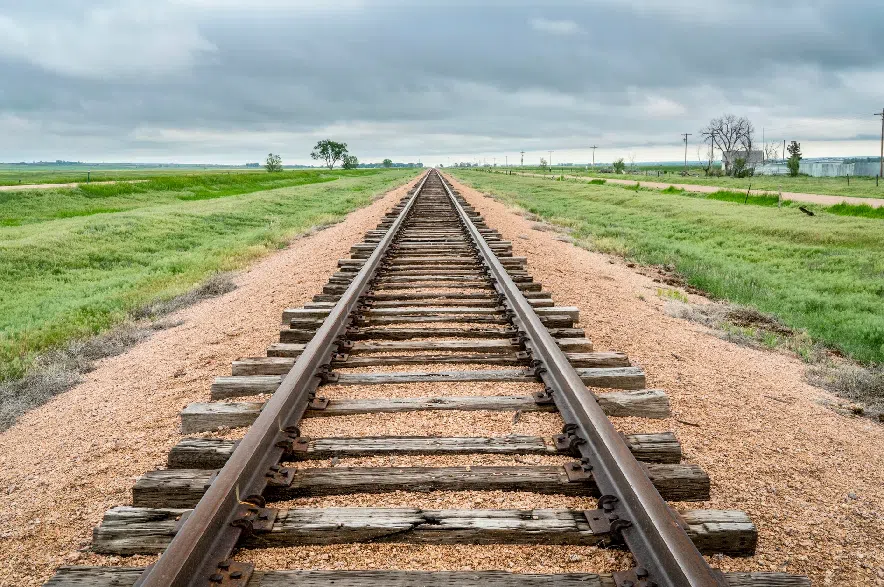As the harvest season continues, Saskatchewan’s highways minister is calling on the federal labour and transport ministers to step in and prevent work stoppages on the Canadian National and Canadian Pacific Kansas City railways.
Thousands of conductors, engineers and yard workers at the two rail lines have been bargaining for months, and both companies have said they will lock out workers on August 22 if an agreement isn’t reached.
Highways Minister Lori Carr sent a letter to federal Transport Minister Pablo Rodriguez and Labour Minister Steven MacKinnon on Tuesday, warning of the potentially harmful effects a work stoppage could have on the economies of both Saskatchewan and Canada.
In the letter, which was shared to social media by Premier Scott Moe, Carr said a decision by the Canada Industrial Relations Board ruling that a work stoppage on the two railways wouldn’t present a public health and safety threat has cleared the way for a possible strike or lockout.
SK producers of grain, oil, potash and other products rely on our rail system.
The federal government must ensure there is no disruption of rail service due to a strike or lockout. SK’s Highways Minister Lori Carr has written to the federal Ministers of Labour and Transport,… pic.twitter.com/zPmGzLscFV
— Scott Moe (@PremierScottMoe) August 13, 2024
“A stoppage will have a devastating effect on the supply chain and damage Canada’s reputation as a reliable training partner with our international customers,” Carr wrote.
“As a landlocked province, Saskatchewan producers depend on reliable rail service and smooth-functioning supply chains to get our products to market. Freight rail services are essential for transporting large volumes of grain, potash, oil and other key exports to domestic and international markets.”
To avoid costly disruptions to the rail network, Carr called on Rodriguez and MacKinnon to step in with measures to prevent a work stoppage while negotiations are resolved. Carr said it could include back-to-work legislation or a directive for binding arbitration prohibiting the union from striking.
“The federal government must ensure there is no disruption of rail service due to a strike or lockout,” Moe added in a social media post.
Moe’s comments echoed those of Saskatchewan Agriculture Minister David Marit, who said on Monday railways should be deemed an essential service.
Dale Heenan, who farms south of Grand Coulee, agreed with the minister, saying a rail stoppage could create a huge backlog with ripple effects that last even beyond a resolution in the labour dispute.
“It backs everything up, and we don’t know how long it could be,” Heenan said.
Teamsters Canada hoping to avoid strike
Christopher Monette, director of public affairs for Teamsters Canada, joined the Evan Bray Show to provide an update on the bargaining.
“Unfortunately, negotiations have been very slow,” said Monette.
“Absent the threat of a work stoppage, the union essentially had no leverage at the bargaining table. So that meant that neither CN nor CPKC had been moving to compromise or show any flexibility in demands.”
Monette said the main sticking points are company demands, as opposed to union proposals. He said the companies want concessions on issues such as crew schedules, rail safety, fatigue management, and worker relocation.
“Our goal has never been to cause a work stoppage. We have done everything we can to avoid coming to this point, but I cannot say the same for the companies,” said Monette.
Listen to the full interview with Monette:
“CN and CPKC are among a very short list of, I would say, problem companies whose bargaining strategies are consistently leading to these massive work stoppages.”
He said the goal has always been to get a fair deal.
“We’re at the table. We’re ready to bargain. Now, whether or not we can avoid a work stoppage is going to be entirely up to CN and CPKC.”
Monette said rail workers are on call 24/7 and have two hours to report for duty once they are called upon. He said there are currently measures in place to ensure that the workers are fit to be able to operate a train for 10 to 12 hours.
“We have measures in our collective agreement to try and mitigate those risks. And the companies already don’t follow them properly, though. And now they just want to get rid of them. So at CPKC, for example, the company is trying to get rid of as many of these provisions as possible, which will basically mean that train crews are going to be forced to stay awake even longer, leading to an increased risk of derailments,” said Monette.
“Meanwhile at CN, they are targeting fewer articles around fatigue and scheduling, but still enough to raise safety concerns. The other issue at CN is they’re trying to implement the forced relocation scheme. Because they claim to struggle with labour shortages and a difficulty attracting and retaining workers – and there is truth to that – but that would see basically workers from one part of the country ordered to move across Canada to another part of the country for months at a time to fill those labour shortages”
Monette said the rail companies should be working on improving working conditions and providing a more humane approach to railroading.
“These sticking points, they’re all company demands. We’re trying to reach an agreement that’s fair and equitable,” said Monette.
–with files from 980 CJME’s Daniel Reech and Kaleb Sebastian







